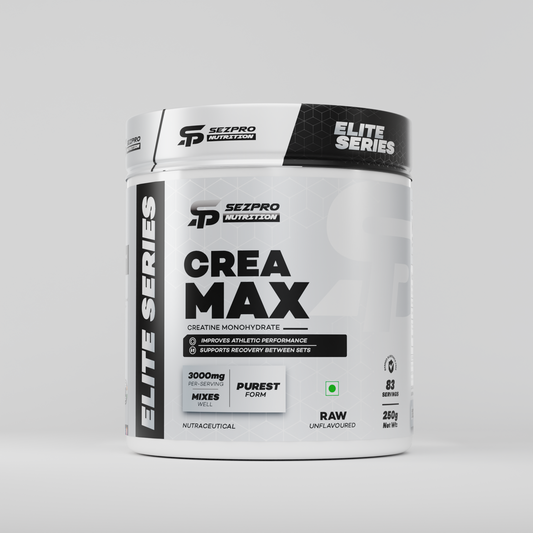Creatine
What is Creatine?
Creatine is a substance found in our muscles (95% of the total Creatine in our body. The other 5% is located in the brain, liver, and kidney). Many athletes and bodybuilders consume Creatine to increase muscle strength and performance. Creatine is a mixture of three Amino Acids, i.e., arginine, glycine, and methionine, and some creatine-rich foods are red meat and fatty fish like tuna and salmon.
Creatine helps produce ATP (Adenosine Triphosphate), which is the body's energy currency and is required for workouts and day-to-day bodily functions. Creatine is popular among athletes and fitness freaks to enhance their workout sessions and recovery. They are safe to use and consumed as recommended, which can be a valuable addition to a well-rounded fitness regimen.One of the most famous forms of Creatine is creatine monohydrate.
Benefits and Uses of Creatine
Creatine offers various benefits and is generally used for several purposes:
Explosive Energy: Consuming Creatine helps to strengthen the body's ability to generate energy during short bursts of intense workout that increases strength and power. Creatine also benefits activities like weightlifting and sprinting.
Enhanced Exercise Performance: Creatine is used by many athletes and bodybuilders to improve overall workout performance, allowing for more reps, sets, or high-intensity workouts. It helps produce ATP, which is crucial for health.
Activity and Daily Physiological Processes
Muscle Growth and Recovery: Creatine promotes the synthesis of new muscle fiber and boosts muscle gain by enhancing the release of a hormone called IGF-1 (Insulin Growth Factor-1). It also helps reduce muscle damage and inflammation, promoting faster recovery after an intense workout. This can be beneficial for people who are fitness enthusiasts.
Increased Muscle Size and Volume and Lean Muscle Mass: Creatine increases water retention, keeping the muscles hydrated, leading to volumization and increased muscle size. It also decreases the levels of a protein called myostatin (which inhibits muscle growth.)Creatine supplements are formulated in a way that contributes to increasing lean muscle mass.
ATP Production: Creatine plays an essential role in the production of adenosine triphosphate (ATP), which helps in transferring energy within cells as it is the energy that our body utilizes to perform all tasks, both vital and nonvital functions.
Neurological Conditions: Creatine is also beneficial in neurodegenerative conditions, such as Parkinson's disease and traumatic brain injuries. It has been shown by a few studies that the consumption of Creatine orally may repair damaged brain cells, prevent muscle loss, and improve motor function.
Fat Loss: Creatine may increase metabolic rate in some people, causing them to lose fat. These are necessary for muscle building and protein incorporation.
Regulates Blood Sugar: Some research shows that creatine consumption, a high-carb meal, can help control blood sugar levels. If a person has diabetes, they should consult a healthcare professional before consumption.
Less fatigue: Since Creatine helps in energy supply, it can help delay the onset of fatigue during longer workouts.
Easy to Use: Creatine supplements, often powder or capsules, are easy to consume daily.While Creatine has several benefits and is used for various purposes, it is advisable to consult with a healthcare professional or nutritionist before consuming any creatine supplement, especially for those with pre-existing health conditions.
Types of Creatine
Some common types of Creatine are given below and have slightly different properties, absorption rates, and potential benefits from each other:
Creatine Monohydrate: This form is the most researched and widely used by several athletes and bodybuilders. Creatine monohydrate is known to be the best creatine supplement as it enhances strength, power, and muscle mass in effective, safe, and affordable ways. It also keeps the muscles hydrated, hence delaying fatigue.
Creatine Ethyl Ester: Some studies have shown that it has better absorption over creatine monohydrate, but due to its ethyl ester form, it is not very effective.
Creatine Hydrochloride (HCL): This form has proven to have better solubility and absorption and reduces the chances of upset stomach consumption. However, scientific evidence supporting its superiority over creatine monohydrate is limited.
Buffered Creatine (Kre-Alkalyn): It formulates Creatine with an alkaline powder that reduces bloating. However, the evidence supporting significant benefits compared to creatine monohydrate must be more conclusive.
Micronized Creatine: This is creatine monohydrate that has undergone a process to decrease the particle size. This Creatine also increases its surface area and improves absorption. It dissolves more easily in water than regular creatine monohydrate.
Liquid Creatine: This Creatine is dissolved in liquid form. However, it is less common, and some argue that creatine stability may be compromised in liquid form if kept for a long time.
Creatine Nitrate: Research has shown Creatine is bound to a nitrate group, which may influence vasodilation and potentially enhance blood flow. However, this form is new, and many studies have yet to be conducted.
Tri-Creatine Malate: It is made up of three creatine molecules and one malic acid molecule, which are all bound together. It is a great supplement choice for all types of athletes and has a lot of benefits. However, exhaustive studies into longer-term effects on your health have yet to be conducted.
While there are different types of Creatine, it is essential to remember that creatine monohydrate remains the most researched and proven form regarding efficacy, safety, and cost-effectiveness. Creatine powder benefits many athletes and bodybuilders, but consulting with a healthcare professional or a nutritionist is recommended before starting any new creatine supplement.
When to Consume Creatine Supplement
While there is no specific timing for consuming Creatine, a few options can be considered for Creatine Pre-Workout: Consuming creatine supplements before your workout session may increase the availability of Creatine in muscles, this can be beneficial if you have a preference for pre-workout supplementation.
Post-Workout: Consuming Creatine during your post-workout session may help increase the nutrition uptake, and taking it Creatine this time may enhance its absorption.
Anytime Throughout the Day: Creatine can be consumed at any time as long as it's consistent. Taking creatine supplements is convenient for those who may forget to take them around their workouts.
With Meals: Consuming Creatine with a meal that contains carbohydrates, may help better absorption as carbohydrates can increase insulin levels, potentially enhancing creatine uptake by muscle cells.
You should always follow the recommended usage guidelines. If you have any medical condition or concerns, it's advisable to consult with a healthcare professional before adding Creatine or any other supplement to your daily routine.
The side effects of Creatine: Creatine has been considered safe for most people when used at recommended dose, but like any other supplement, it may cause side effects in some individuals. Here are some of the side effects of Creatine.
Gastrointestinal Issues: Consuming Creatine causes stomach discomfort, bloating, cramping, or diarrhoea, and these issues are often dose-dependent and may cause damage when taking Creatine with meals.
Dehydration: Creatine increases muscle water content and sometimes can lead to dehydration if not enough water is consumed. It's essential to stay hydrated when using Creatine.
Gain: Creatine may increase muscle water retention, which could slightly increase body weight. This is not the same as gaining fat and is generally temporary.
Allergic Reactions: Creatine supplements may cause symptoms such as itching, rash, or difficulty breathing. Some people may be allergic to Creatine and seek medical attention immediately if this happens.
How do you choose the right Creatine for you?
Opt for creatine monohydrate over other forms when considering a creatine powder supplement. Choose micronized creatine monohydrate for its improved mixability due to smaller particle size. Pick unflavored Creatine Without artificial additives, colours, or preservatives for better benefits.
What precautions should be taken while choosing the right Creatine?
- Allergens- If you are allergic to certain things, check the ingredients list to look for allergens or other substances that will not suit your body.
- Authenticity- Make sure all the ingredients added to your product are authentic.
- Certification- Make sure to purchase a certified supplement from an authorised seller, and avoid buying fake or third-party products.
- Consultation- Individuals with medical conditions such as diabetes, gout, liver, or kidney disease should consult a doctor before starting creatine supplementation.
- Dosage- Always adhere to the recommended dosage instructions on the product label to avoid potential harm from excessive creatine consumption.
- Individual Compatibility- Monitor your body. In case of discomfort or unfavourable symptoms, discontinue immediately and contact your physician.
Why is Creatine Monohydrate considered the best?
Creatine monohydrate is considered the best and most researched form because of its proven efficacy, safety, and affordability. Creatine monohydrate is formulated in a way that helps enhance athletic performance, increases muscle mass, and improves strength. Its stability and high solubility make it easy to mix with liquids, which helps in better absorption. Creatine monohydrate is one of the best creatine supplements because it is widely available at a very reasonable price, thus making it an ideal choice for athletes, bodybuilders, and fitness enthusiasts.
Where to buy Creatine?
SezPro Nutrition manufactures best creatine supplements with high-quality ingredients. You can get the best creatine supplement at a reasonable price with genuine products if you choose our brand.
Which is the Best Creatine Supplement?
Sezpro Crea max creatine monohydrate is formulated with 3000 mg of Creatine with Creatine form per serving that helps to improve athletic performance and supports recovery between sets. If you want to buy one of the best creatine monohydrates, visit our website.
FAQs About Creatine
Is it safe to take Creatine Supplements every day?
Yes, you can take creatine supplements every day under the proper guidance of your trainer. You can consume Creatine with creativeness supplements like whey protein at the recommended dosage.
Who can consume Creatine?
Creatine can be consumed by everyone including athletes, bodybuilders, gym goers and fitness enthusiasts. But people with bipolar disorder, high uric acid levels and liver or kidney disorder should consult with a healthcare professional before taking it.
Is it advisable to use Creatine during the Creatine Cutting phase to promote the development of lean muscle mass?
The answer is yes; creatine combination, creatine-intense training, and a balanced diet can help build lean muscle gain, decrease body fat, and improve overall body composition. But, consult a healthcare professional to avoid any unfavourable symptoms.
Is it necessary to load Creatine?
It is not necessary to load creatine, but if you are involved in intense workouts, loading is recommended for better results.
How much Creatine per day is recommended?
I am taking 3 grams of Creatine per day. However, consult with a healthcare professional if you want to increase the dosage.

